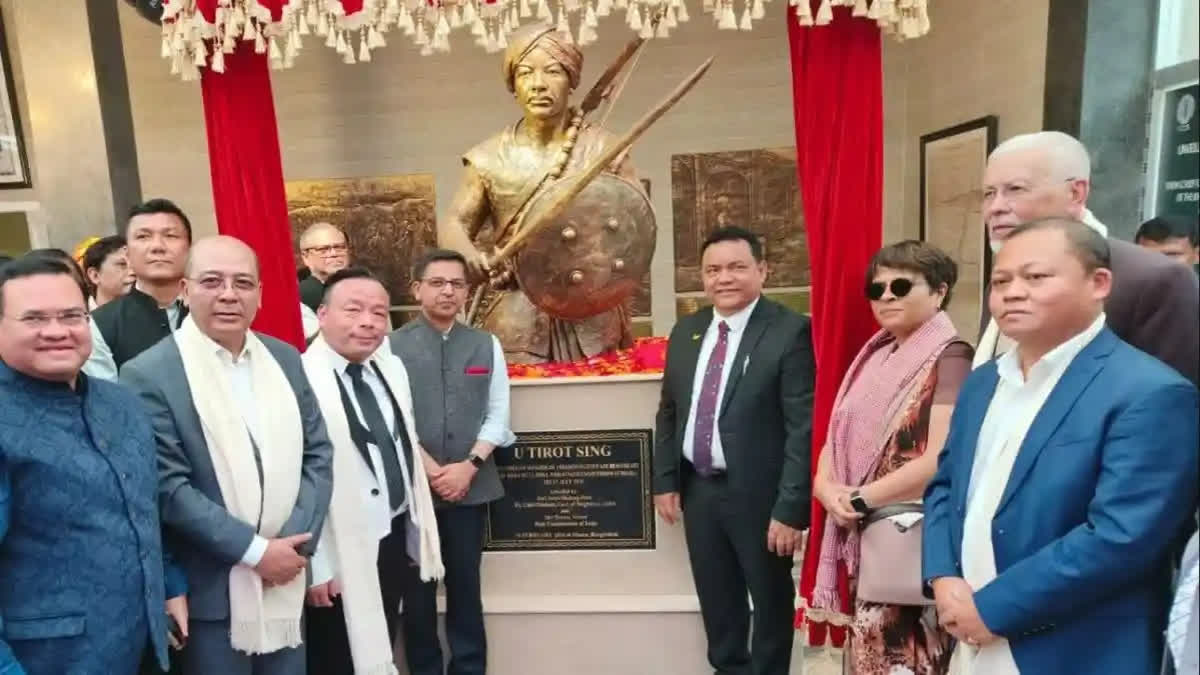New Delhi: In what can be seen as a further deepening of cultural ties between India and Bangladesh, a memorial to commemorate the legacy of U Tirot Sing Syiem, one of the earliest freedom fighters, who hailed from Meghalaya, has been inaugurated at the Indira Gandhi Cultural Centre (IGCC) in Dhaka. A statue of Tirot Sing was also unveiled to foster a better understanding of the shared histories of the two countries.
After Frederick Roy Kharkongor, Commissioner of Meghalaya’s Department of Arts and Culture, took the initiative to honour the legacy of the Khasi Hills’ greatest patriotic son in Dhaka, Indian High Commissioner to Bangladesh Pranay Verma gave his approval for the project in August last year. The memorial is the outcome of the collective efforts of the Meghalaya government, the Indian Ministry of External Affairs, the Indian High Commission in Bangladesh, the Indian Council for Cultural Relations (ICCR) and the IGCC in Dhaka.
A report in The Daily Messenger quoted High Commissioner Verma as saying during the event held on Friday that a strong historical bond between Meghalaya and Bangladesh has been established. Kharkongor, who was also present at the inauguration ceremony, said that Tirot Sing fought the British with bows, arrows, spears and swords, the first ever recorded history of guerrilla warfare in India.
Who was Tirot Singh? What was his role in India’s freedom movement? And what was his connection with Bangladesh?
A valiant warrior and visionary leader, Tirot Sing emerged as a symbol of resistance against British colonial rule in India during the early 19th century. Born in 1785 in the village of Nongkhlaw in the West Khasi Hills district of present-day Meghalaya, he drew his lineage from the Syiemlieh clan. He was Syiem (chief) of Nongkhlaw, part of the Khasi Hills. His surname was Syiemlieh. He was a constitutional head sharing corporate authority with his Council, general representatives of the leading clans within his territory.
From a young age, Tirot Sing exhibited exceptional leadership qualities and a deep sense of patriotism. His early experiences exposed him to the harsh realities of British colonialism, as the East India Company expanded its influence across the Indian subcontinent. Tirot Sing witnessed the imposition of unfair taxes, the exploitation of local resources, and the degradation of traditional customs and values.
In 1824, David Scott, representing the East India Company, approached Tirot Sing seeking permission to construct a connecting road through the Khasi Hills for British troops. Tirot Sing, after consulting his durbar, agreed to the proposal, provided that the British would refrain from interfering in the internal affairs of the state. However, the British government did not adhere to the agreed-upon terms and imposed revenue on the Nongkhlaw state.
It became evident that Scott had a hidden agenda, particularly his interest in the 'Duars' or passes to Assam. Sensing this ulterior motive, a point of contention arose, leading to a full-fledged conflict. Tirot Sing, in collaboration with other hill chiefs, was resolute in expelling the colonisers from his homeland. On April 4, 1829, Sing dispatched a group of Khasi warriors and declared war against Lt Burlton in Nongkhlaw. Thousands of young men and women joined forces with Tirot Sing in a unified effort to resist the foreign power.
The first-ever uprising against British authority in the northeastern region of India, led by Tirot Sing, is famously referred to as the ‘Nongkhlaw Massacre’. The British Garrison in Nongkhlaw faced an assault, during which Tirot Sing’s forces killed two British officers, Richard Gurdon Bedingfield and Philip Bowles Burlton. Although their primary target, Scott, managed to escape, this led to retaliatory British military operations against Tirot Sing and other Khasi chiefs.
Tirot Sing’s remarkable feat instilled fear and sent shockwaves among the British rulers. Armed solely with bows and arrows, two-handed swords, shields and bamboo rods, Tirot Sing and his regiment engaged in a fierce battle against the well-equipped British administrators in the hilly terrain. Despite months of unwavering resistance, the exhausted Khasi warriors eventually had to retreat towards the hills. However, a fierce battle ensued along the way, resulting in the deaths of many foreign soldiers and officers, along with significant casualties, among the Khasi warriors.
